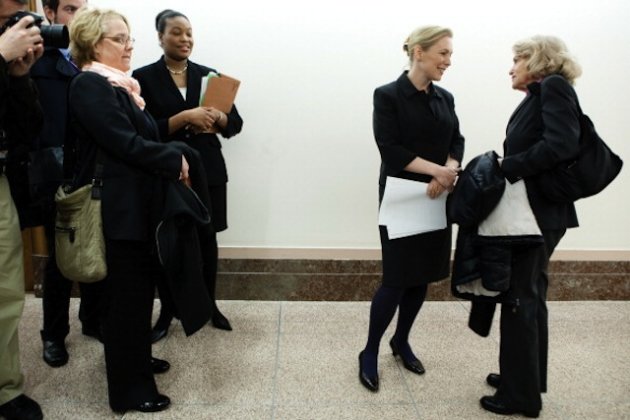 Sen. Kirsten Gillibrand (D-NY) talks with Edith Windsor (R) in the hallway before a news conference on gay marriage.??
Sen. Kirsten Gillibrand (D-NY) talks with Edith Windsor (R) in the hallway before a news conference on gay marriage.??
On Wednesday, the Supreme Court justices will hear arguments in the second gay marriage case ever in the court's history, again raising hopes from both sides that the court will weigh in decisively on the issue after justices suggested on Tuesday that they may dodge a decision in California's gay marriage case.
The case is Windsor v. United States, a challenge to the 1996 Defense of Marriage Act, which prohibits the federal government from recognizing same-sex marriages even in the nine states and District of Columbia that allow them. Eighty-three-year-old New Yorker Edith Windsor brought the suit after she was made to pay more than $363,000 in estate taxes when her same-sex spouse died, because the federal government did not recognize their marriage.
Windsor married her partner of more than four decades, Thea Spyer, in 2007 in Canada. Four years later, New York state legalized gay marriage.
Windsor argues that the law, commonly referred to as DOMA, unfairly excluded her marriage in more than 1,000 federal statutes in which marriage is relevant, including key parts of the tax code. She says the government has no legitimate reason to exclude same-sex married couples from benefits received by opposite-sex couples, and that she and other gay couples are being denied equal protection under the law.
The Obama administration has declined to defend DOMA, so the House of Representatives appointed seasoned attorney Paul Clement, who has argued before the Supreme Court many times, to take up the case. Clement will most likely argue that the federal government is not intruding on states' definition of marriage, but simply using its own definition in regard to federal benefits. He also has argued in legal briefs that the federal government has an interest in defining marriage as only between opposite sex couples because it encourages them to form stable family relationships when they procreate.
On Tuesday, some justices?including key swing vote Anthony Kennedy?expressed skepticism that the supporters of California's Proposition 8 have the legal authority to defend the law after the state's attorney general decided to drop the case. The DOMA case also is dogged by procedural issues, and it's possible the justices may throw it out without issuing a decision, letting the lower court's opinion stand. The Supreme Court has appointed a private lawyer to argue on Wednesday that the House of Representatives does not have standing in the case, signaling that the justices have real concerns about the standing issue.
It's possible that justices could dodge decisions in both Proposition 8 and DOMA, which would most likely be disappointing for proponents of both sides. If the DOMA case is thrown out, the federal government would most likely have to pay Windsor back her taxes, but the federal law would still remain in place. If the justices decide to dismiss Proposition 8, gay marriage will most likely become legal in California but not in other states.
But if the justices decide the House does have standing to appeal on behalf of DOMA, some legal experts have argued that the liberal justices may attract support from conservative justices to strike down the law by appealing to a states' rights argument. Marriage traditionally has been regulated by the states, the argument goes, and DOMA is unfairly interfering with New York and the eight other states that allow gay marriage.
Erwin Chemerinsky, the founding dean of University of California at Irvine Law School, said that based on the Proposition 8 oral argument, he was skeptical of that. "I think Justices Scalia and Alito clearly indicated the they're hostile to the marriage equality opinion," Chemerinsky said. "Thomas is likely to be with them."
If the conservative justices attract Kennedy, who has written two major opinions upholding gay rights, then DOMA would be affirmed as law. That would deal a blow to the gay rights movement strategy of getting gay marriage passed state-by-state, since the federal government would not be required to recognize those marriages. It's also possible that the court could use DOMA as a vehicle to declare that gay people have a right to marriage, though most legal experts say that's unlikely. The Proposition 8 case was seen as the better bet for gay marriage supporters to get a broad decision out of the justices, since the DOMA case is more narrowly focused on one aspect of a federal law.
roger goodell psychosis dianna agron million hoodie march tebow trade mike the situation jacksonville jaguars
No comments:
Post a Comment